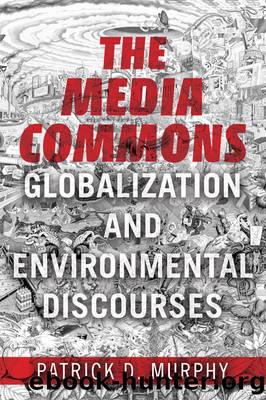The Media Commons by Patrick D Murphy

Author:Patrick D Murphy [Murphy, Patrick D]
Language: eng
Format: epub
Tags: Social Science, General, Media Studies, Political Science, Public Policy, Environmental Policy, Nature, Environmental Conservation & Protection
ISBN: 9780252099588
Google: hKuzDgAAQBAJ
Publisher: University of Illinois Press
Published: 2017-03-29T02:41:03+00:00
Remaking Monsanto
To appear less like a lumbering monstrosity, feared and chased by the peasants of the global village for reasons ranging from charges of environmental injustice and bio-prospecting to being a merchant of a biological Pandoraâs box, the company has work hard to craft a new public image as a sustainable food producer. Monsanto actually began to pursue this path in earnest in the mid-1990s. According to Robert B. Shapiro, Monsantoâs chairman and CEO from 1995 to 2000, the biotech company had a long history of considering environmental issues in its economic, technological, and competitive planning, but it wasnât until 1994, when an offsite meeting of a group of twenty-five âcritical thinkersâ led to a more deliberate focus on sustainable development (Magretta 1997). The embrace of sustainability created the opportunity for Monsanto to attempt to exorcize its ghosts, with the âoriginalâ industrial chemical and pharmaceutical Monsanto spinning off in 2000 to merge with Pfizer and Solutia to become âPharmacia Corporation.â13 Through this reformation of the company, the agricultural and biotech assets, operations, and liabilities were transferred to the ânewâ Monsanto, which now concentrated on the development of hybrid corn and other row crops, along with its keystone product, Roundup herbicide. From 2008 through 2012, Monsantoâs image makers made the decision to promote the company as a ânewâ âfood companyâ dedicated to producing seed for farmers. That tagline has been subsequently revised, and Monsanto now defines itself as a âsustainable agricultural companyâ committed to meeting the âneeds of a growing population, to protect and preserve the planet we all call home, and to help improve lives everywhere.â14 While the terminology has been adjusted over the past few years, and these semantic modifications will likely continue, the aim remains the same: recasting the company as a progressive problem solver serving humanity through biotechnology, while distancing itself from the âoldâ and controversial chemical company from days of yore.
Given the companyâs past product line, this is no small task and therefore perhaps no surprise that the new, sustainability-driven Monsanto has invested heavily in elaborating a sophisticated, interlaced media network to help reshape its image. Like Coca-Cola, Comcast, and Google, information about Monsantoâs activities and commitment to the environment is available online through a multiplatform universe of blogs, social media, videos, journals, âwebisodes,â and so forth. And like similar strategies of large corporations using media to reach out to its imagined publics, the Monsanto mediascape includes mission and vision statements, sustainability reports, educational materials, and overviews of environmental policies and practices. However, what separates Monsanto from most other companies attempting to attach their brand identity to environmental responsibility is that Monsantoâs challenge isnât just about grafting its image onto progressive ecological activities; rather, they seek to establish a credible narrative that what it actually makes is not only environmentally responsive but vital for a planet in crisis. As I show in the rest of this chapter, Monsanto has done this by drawing heavily from the Limits discourse as well as the more problem-solving-centered Sustainable Development discourse to set up a Promethean solution.
Download
This site does not store any files on its server. We only index and link to content provided by other sites. Please contact the content providers to delete copyright contents if any and email us, we'll remove relevant links or contents immediately.
How to Do Nothing by Jenny Odell(2652)
A Forest Journey by John Perlin(2590)
The Plant Messiah by Carlos Magdalena(2459)
Babylon's Ark by Lawrence Anthony(2077)
Energy Myths and Realities by Vaclav Smil(2069)
The ESV Study Bible by Crossway Bibles(1962)
Abbey in America by Murray John A(1811)
Fatal Storm by Rob Mundle(1793)
Witness Tree by Lynda V. Mapes(1699)
Shadows on the Gulf by Rowan Jacobsen(1521)
Client Earth by James Thornton(1510)
Brokeback Mountain by Annie Proulx(1474)
Coming Back to Life by Joanna Macy(1468)
Water Rights and the Environment in the United States by John Burch(1416)
Cosmos by Carl Sagan(1406)
Ten Billion by Stephen Emmott(1386)
Mycelium Running: How Mushrooms Can Help Save the World by Paul Stamets(1290)
The overachievers by Robbins Alexandra(1287)
The Uninhabitable Earth by David Wallace-Wells;(1198)
